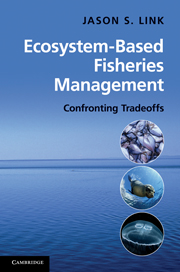Summary
The subtitle of this book conveys the essence of what ecosystem-based management is all about: confronting tradeoffs.
Here is a question I have been asked, in one form or another, about once a month for the past five years: Will there be enough herring (i.e. a key forage fish species) left for all of the fisheries that target them, the whales that eat them, the piscivorous fish that also eat them, the plankton that are eaten by them to be cropped down, and the jellyfish that compete with them to be kept in check; all while nutrients and water temperatures are notably changing? This one example of a focal species makes the tradeoffs among a suite of issues readily apparent – and this is just one instance among a plethora of such examples.
It has become abundantly clear that we need to explore and address these tradeoffs. Ignoring them (particularly via focusing solely on one stock at a time) has become singularly less of a viable option, so allow me to explain how all these thoughts began to coalesce in my ponderings of these kinds of issues.
Some of the first formal stock assessments I sat in on were quite shocking to me, a scientist primarily trained as an ecologist with a particular interest in predator–prey interactions. Aside from the incredible stakes of the results, which led to palpable animosity from all attending stakeholders, what struck me were the assumptions of natural mortality.
- Type
- Chapter
- Information
- Ecosystem-Based Fisheries ManagementConfronting Tradeoffs, pp. ix - xivPublisher: Cambridge University PressPrint publication year: 2010



